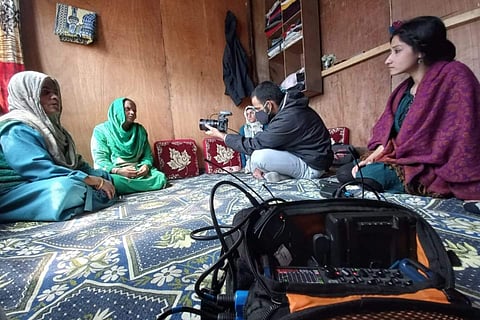
- LIFESTYLE
- FASHION
- FOOD
- ENTERTAINMENT
- EVENTS
- CULTURE
- VIDEOS
- WEB STORIES
- GALLERIES
- GADGETS
- CAR & BIKE
- SOCIETY
- TRAVEL
- NORTH EAST
- INDULGE CONNECT

It was during a family trip to Kashmir that Mumbai-based independent filmmaker Neha 'Bhavini' Sharma stumbled upon a Kashmiri-speaking woman, who also spoke Bengali and seemed to be a forlorn character in the valley. The contrast was so stark that it aroused Neha’s curiosity and led her to delve deeper into the subject. After several trips to Kashmir, she could unearth the truth and turned it into a documentary, titled Nybreum – The Unsettled Shade. The documentary won the Golden Royal Bengal Award for the best Indian Documentary Film at the recently held 28th Kolkata International Film Festival (KIFF). We got chatty with Neha to find out more about the film.
What is your documentary Nybreum –The Unsettled Shade about?
The documentary explores the dark side of human trafficking, a niche segment within the industry called bride-trafficking (based solely on religion) between Kashmir and Kolkata, taking place for
over three decades in the valley. Kashmiri men who cannot ‘afford’ local brides as they demand
more money for mehr (bride price) — marry these young women being uprooted from Bengal. This lesser-known practice is something we do not associate with Kashmir considering the romanticism built around the valley owing to its natural beauty.
What do these women face?
The approximate age difference between the groom and bride is 10-15 years, if not more. But this age difference or being trafficked from the roots are not the only issues. Rather, these episodes are only the beginning of a victim’s woes that last a lifetime. Racial discrimination, strong social condemnation, a
questionable sense of belonging despite inhabiting the Valley over several years and the sheer injustice of being brought to an alien land without much choice and through various modes of deception are matters that have been overlooked for way too long.
How long did it take you to shoot it?
It took me several trips to Kashmir for research purposes. A few locals helped me find the victims but it was an uphill task from thereon. I had a rather organic approach which fits the bill well for creating documentaries. It took almost a year to shoot and ready this for viewing.
What are the hurdles you had to face?
Nobody has ever cared for these women or has given them one heartfelt hearing. So, the primary challenge was to win their hearts and it takes a lot of courage for them to speak about these things. They are also not accepted by the community, now, if they talk about it, they are unsure as to what will come their way. The
women in Kashmir spoke their hearts out, once I could win their trust, but in Kolkata, neither the lawmakers nor the police opened up. There were only a few NGOs in Kolkata that were of help. We shot during the period when COVID-19 was lurking around hence we took a minimal crew of 5-7 members besides local help.